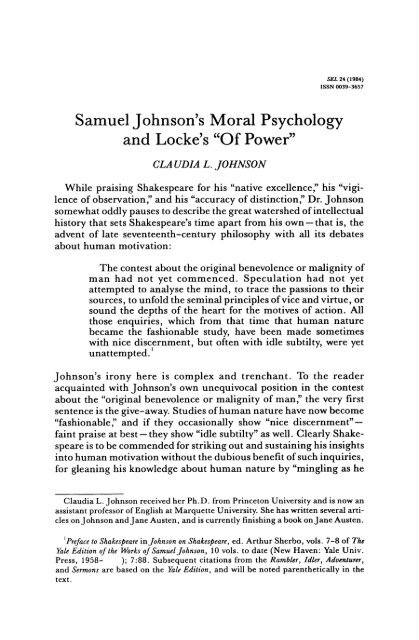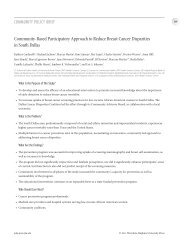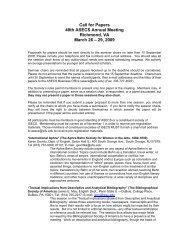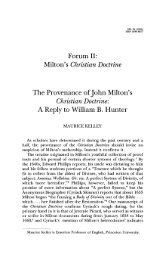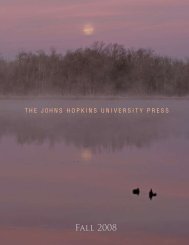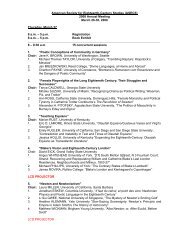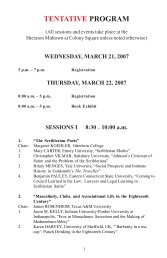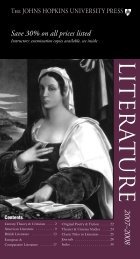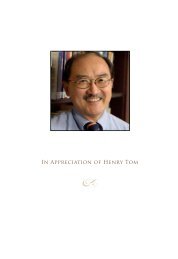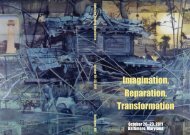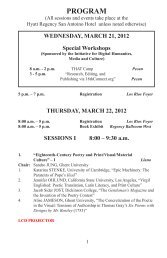Samuel Johnson's Moral Psychology and Locke's - The Johns ...
Samuel Johnson's Moral Psychology and Locke's - The Johns ...
Samuel Johnson's Moral Psychology and Locke's - The Johns ...
- No tags were found...
Create successful ePaper yourself
Turn your PDF publications into a flip-book with our unique Google optimized e-Paper software.
566 JOHNSON'S AND LOCKE'S PSYCHOLOGYour wills in the pursuit or forbearance of it as we choose after this due<strong>and</strong> rational examination. Although <strong><strong>Johns</strong>on's</strong> citations rangethrough the whole of this extremely long chapter (by far the longest inthe Essay), particular sections-such as 2.21.45, 50, 53-56, 58-59<strong>and</strong> 69-have been broken down <strong>and</strong> re-presented almost in theirentirety. <strong>The</strong> scope of the citations themselves is enormous. First,<strong>Johns</strong>on uses this chapter as an illustrative source for the language ofmoral philosophy, citing words such as "freewill," "free," "liberty,""volition," "compulsion," <strong>and</strong> "choice" on <strong>Locke's</strong> authority. <strong>Johns</strong>onillustrates the word "motive," for example, without any modificationof <strong>Locke's</strong> original: "<strong>The</strong> motive for continuing in the same state oraction is only the present satisfaction in it; the motive to change isalways some uneasiness."7Second, <strong>Johns</strong>on draws on the less technical explanatory wordsLocke employs when amplifying his theory, as the following parallelpassages show.This is the hinge on whichturns the liberty of intellectualbeings, in their constantendeavours after <strong>and</strong> asteady prosecution of truefelicity, that they can suspendthis prosecution in particularcases till they have lookedbefore them, <strong>and</strong> informedthemselves whether that particularthing which is thenproposed or desired lies inthe way to their main end.(Essay, 2.21.52)[endeavour]This is the hinge on whichturns the liberty of intellectualbeings, in their constantendeavours after, <strong>and</strong> a steadyprosecution of true felicity.[suspend]This is the hinge on whichturns the liberty of intellectualbeings, in their steadyprosecution of true felicity,that they can suspend thisprosecution in particularcases, till they have lookedbefore them.[look]Intellectual being, in theirconstant endeavours aftertrue felicity, can suspend thisprosecution in particularcases, till they have lookedbefore them, <strong>and</strong> informedthemselves, whether that7<strong>Johns</strong>on used either the fourth (1740) or the fifth (1751) edition of <strong>Locke's</strong> collectedworks (see Wimsatt, pp. 154-55). Except for modernizing the spelling <strong>and</strong>reducing the number of italicized works, Yolton presents the text as <strong>Johns</strong>on wouldhave read it.
568 JOHNSON'S AND LOCKE'S PSYCHOLOGY[chat]<strong>The</strong> least is no inconsiderablegood, but such as he confessesis far greater than thetickling of his palate with aglass of wine, or the idle chatof a soaking club.<strong>The</strong>se passages exemplify the kind of violent truncation <strong>Johns</strong>on <strong>and</strong>his amanuenses occasionally resort to in order to conserve space. <strong>The</strong>virtually unintelligible illustration of "tickle" represents one of those"mutilated examples," those "clusters of words, in which scarcely anymeaning is retained," that<strong>Johns</strong>on apologizes for in the Preface to theDictionary.9 In any event, the words "tickle',""soak," <strong>and</strong> "chat" arehardly the diction of moral philosophy. Yet <strong>Johns</strong>on has taken care topreserve <strong>Locke's</strong> extremely sententious contexts, so that the readermay be morally instructed regardless of how incongruous the wordmay seem in didactic discourse. It is worth pointing out here that,except where the original is already cast in the form of a definition,<strong><strong>Johns</strong>on's</strong> citations are not especially apt. Although <strong>Johns</strong>on waswithout doubt extremely selective about illustrations of morally ortheologically significant words, on the whole he does not appear tohave been fastidious about how well <strong>Locke's</strong>-or anybody else'ssentencesactually illustrate more or less "neutral" terms. <strong>Johns</strong>onwent from favored texts <strong>and</strong> passages to particular words. He usedthose two chapters of <strong>Locke's</strong> Essay because he liked <strong>and</strong> approved oftheir moral arguments, not because they offered elegant usages ofwords such as "tennis"-ball <strong>and</strong> "of."<strong>Locke's</strong> description of human life rang true to <strong>Johns</strong>on. To Locke,as to <strong>Johns</strong>on, we spend our lives endeavoring to satisfy successivedesires, where desire is defined as the "uneasiness a man finds in himselfupon the absence of anything whose present enjoyment carries9In the Preface to the Dictionary, <strong>Johns</strong>on further explains that "by hasty detruncation,"the "general tendency of sentences may be changed: the divine may desert histenets, or the philosopher his system." Many of <strong>Locke's</strong> sentences are indeed hastilydetruncated, but the general tendency of his sentences, while often drastically limited,is rarely actually changed. An exception: in Essay 2.20.6, Locke writes, "Forwhatever good is proposed, if its absence carries no displeasure or pain with it, if aman may be easy <strong>and</strong> content without it, there is no desire nor endeavour after it."Citing the word "displeasure,"<strong>Johns</strong>on writes, "When good is proposed its absencecarries displeasure or pain with it." <strong>Johns</strong>on cites sentences similar to <strong>Locke's</strong> originalelsewhere in the Dictionary, so his reason for changing the sense here was clearlynot editorial but purely practical.
CLAUDIA L. JOHNSON569the idea of delight with it" (2.20.6, cited under "desire"). This uneasiness,as Locke explains, is the "chief, if not only, spur to human industry<strong>and</strong> action" (2.20.6, cited under "spur"). To claim that theuneasiness of desire invariably motivates us to obtain the happinessor pleasure which the satisfaction of that desire seems to promise maysound grossly hedonistic <strong>and</strong> altogether contrary to the spirit of<strong><strong>Johns</strong>on's</strong>pervasive moralism. <strong>Johns</strong>on himself, however, obviously didnot regard the matter in this light. For <strong>Johns</strong>on, too, desire is theactive principle, <strong>and</strong> even in religious contexts he does not hesitate toargue that the desire for gratification is the motive for all our actions.In Sermon 14, for example, <strong>Johns</strong>on declares, "Every man is conscious,that he neither performs, nor forbears any thing upon anyother motive than the prospect either of an immediate gratification,or a distant reward." It is, moreover, precisely the uneasiness Rasselasfeels in want of absent good that sends him questing for happinessesother than the now palling ones his tedious Happy Valley offers: "giveme something to desire," he pleads, for "some desire," as Imlac laterexplains, is "necessary to keep life in motion."'0In addition to endorsing <strong>Locke's</strong> effort to legitimize the energy generatedby the uneasiness of desire, <strong>Johns</strong>on was equally responsive tothe restlessness <strong>and</strong> perpetual dissatisfaction implicit in this theory ofhuman motivation. Because we live in what Locke calls a "narrowscantling of capacity, we "enjoy but one pleasure at once" (2.21.59,cited under "scantling"). For this reason, the contentment we may feelafter satisfying one desire soon dissipates as the uneasiness we feelupon immediately desiring something else sends us in pursuit of happinessyet again: "no sooner is one action dispatched, which by such adetermination of the will we are set upon, but another uneasiness isready to set us on work" (2.21.45, cited under "despatch" <strong>and</strong> "set").<strong>The</strong> uneasy, restlessly pursuing condition Locke describes is essentiallyidentical to<strong><strong>Johns</strong>on's</strong> conception of our condition, according towhich our desires always fall a step short of the possibilities for presentsatisfaction, <strong>and</strong> all our pursuits are doomed, like Rassalas itself, toinconclusiveness: "we desire, we pursue, we obtain, we are satiated;we desire something else, <strong>and</strong> begin a new pursuit" (Rambler No. 6).Clearly, the "hunger of imagination" as it responds to the uneasinessof our desires or fears, the paradigm of wanting, pursuing, obtaining,<strong>and</strong> wanting all over again, which we have come to think of as distinctively<strong>Johns</strong>onian, is not uniquely <strong>Johns</strong>onian at all. What <strong>Johns</strong>onrecognized <strong>and</strong> unquestionably appreciated in <strong>Locke's</strong> dis-'?<strong>The</strong> History of Rasselas, Prince of Abissinia, ed. Geoffrey Tillotson <strong>and</strong> BrianJenkins (Oxford: Clarendon Press, 1971), chs. 3, 8. Subsequent citations will benoted parenthetically.
570 JOHNSON'S AND LOCKE'S PSYCHOLOGYcussion was the traditional "vanity of vanities" theme developed witha psychological emphasis on the structure of human desiring itself.11Neither Locke nor <strong>Johns</strong>on stops with the "naturalistic" explanationof motivation we have just outlined. Indeed, <strong>Locke's</strong> conspicuouslyprescriptive arguments in "Of Power" seem to have impressed<strong>Johns</strong>on. <strong>The</strong>se prescriptive intentions deserve close attention,because critics of<strong><strong>Johns</strong>on's</strong> relationship to Locke have not generallybeen willing to recognize <strong>Locke's</strong> intensely moral purposes, <strong>and</strong> thisunwillingness in turn suggests a failure to read "Of Power" as attentively<strong>and</strong> sympathetically as <strong>Johns</strong>on himself manifestly did. WhenRobert Voitle, for example, sets <strong>Johns</strong>on apart from naturalisticpsychologists - such as Hobbes <strong>and</strong> Locke - by stressing the "degreeof free will [<strong><strong>Johns</strong>on's</strong>] emphasis on reason confers on man," he isapparently unaware that <strong>Locke's</strong> aim in "Of Power" is to insist upon<strong>and</strong> account for the role reason has in insuring our free agency <strong>and</strong>our dignity.'2 Even Paul Kent Alkon, who has written so persuasivelyon the Lockean background of<strong><strong>Johns</strong>on's</strong> moral thought, <strong>and</strong> who hasnoted many of his citations from "Of Power," falls into a similar error.He finds in <strong><strong>Johns</strong>on's</strong> moral essays "a harmonious acceptance of<strong>Locke's</strong> descriptive psychology within a broader framework of ethicalconcern"- as if <strong>Locke's</strong> moral psychology were purely descriptive <strong>and</strong>not already developed "within a broader framework of ethical concern."As Hans Aarsleff has demonstrated, these persistent misunderst<strong>and</strong>ingsoriginate in the nineteenth century, when Locke wasfrequently charged with hedonism or utilitarianism, despite the factthat he advances quite a different moral position in "Of Power."14 Whatconcerns us here is that these misunderst<strong>and</strong>ings seriously interferewith our appreciation of what <strong>Johns</strong>on-no hedonist or utilitariansaw<strong>and</strong> valued in Locke."See Walter Jackson Bate, <strong>The</strong> Achievement of <strong>Samuel</strong> <strong>Johns</strong>on (New York: OxfordUniv. Press, 1955), pp. 63-91."Robert Voitle, <strong>Samuel</strong> <strong>Johns</strong>on the <strong>Moral</strong>ist (Cambridge, Mass.: Harvard Univ.Press, 1961), p. 25. Voitle argues that, aside from sharing an appreciation for thehard facts of experience, <strong>Johns</strong>on <strong>and</strong> Locke have very little in common. See alsoJean A. Hagstrum, <strong>Samuel</strong><strong><strong>Johns</strong>on's</strong> Literary Criticism (Minneapolis: Univ. of MinnesotaPress, 1952), p. 8."Paul Kent Alkon, <strong>Samuel</strong> <strong>Johns</strong>on <strong>and</strong> <strong>Moral</strong> Discipline (Evanston: NorthwesternUniv. Press, 1967), pp. 80, n. 47; p. 86. My argument does not challenge Alkon'swork but rather suggests that his conclusions need not be so tentative.4lHans Aarsleff, "<strong>Locke's</strong> Reputation in Nineteenth-Century Engl<strong>and</strong>," in FromLocke to Saussure (Minneapolis: Univ. of Minnesota Press, 1982), pp. 120-45. I amalso very indebred to Aarsleff's "<strong>The</strong> State of Nature <strong>and</strong> the Nature of Man inLocke," inJohn Locke: Problems <strong>and</strong> Perspectives, ed.John W. Yolton (Cambridge: CambridgeUniv. Press, 1969), pp. 99-136. See also Raymond Polin, "John <strong>Locke's</strong>Conception of Freedom," in this same collection, pp. 1-18.
CLAUDIA L. JOHNSON571In presenting human behavior as a perpetual quest after successivegratifications, Locke is far from recommending that this is how weought to behave. This is simply how we would behave if we had noreference to futurity <strong>and</strong> no power to direct our actions towards thatend, <strong>and</strong> if immediate <strong>and</strong> "natural" impulses alone governed ourbehavior. If this were the case, as Locke writes with quiet contempt,we would be no more than "a company of poor insects, whereof someare bees, delighted with flowers <strong>and</strong> their sweetness; others beetles,delighted with other kinds of vi<strong>and</strong>s" (2.21.55, cited under "delight"<strong>and</strong> "bee"). In <strong>Locke's</strong> view, the desires that motivate us under thesecircumstances are not turbulent or voracious. Instead, they aremean, insect-like, but entirely absorbing. This vision is not unlike<strong><strong>Johns</strong>on's</strong> survey of that swarm of ceaselessly wishing humanity at theoutset of "<strong>The</strong> Vanity of Human Wishes"-<strong>and</strong> it is <strong>Johns</strong>on, notLocke, who cannot maintain this confidently judgmental posture forlong. But <strong>Johns</strong>on, too, typically describes our actions in ruthlessly"naturalistic" ways, while likewise making it clear that we do have thepower to govern our desires <strong>and</strong> behave according to principle. InRambler No. 151, for example, after discussing the "climactericks ofthe mind," he explains, "I have in this view of life considered men asactuated only by natural desires, <strong>and</strong> yielding to their own inclinationswithout regard to superior principles, by which the force ofexternal agents may be counteracted. . . . human desires will bealways ranging; but these motions, though very powerful, are notresistless; nature may be regulated."Locke also wishes to regulate nature <strong>and</strong> to recommend the operationof "superior principles." In "Of Power" he sets out to explainexactly how this is possible. He argues that the proper way of behavingis not to be found either by doing everything we desire or by cultivating"indifferency" <strong>and</strong> extinguishing desires, but rather bycounteracting our temporal desires with other desires that refer tothese "superior principles." During the time between desiring <strong>and</strong>determining our wills to pursue or forbear that desire, we must usethe liberty we have to suspend the prosecution of a given desire untilwe have rationally judged whether it will promote our truehappiness-<strong>and</strong> our true happiness, Locke repeats, is the reward ofeternal bliss. Through the intervention of our judgment, which willeither reject or approve the pursuit of a proposed desire on the basis ofreasoned assessments <strong>and</strong> comparisons, we must make our desire foreternal happiness <strong>and</strong> our fear of eternal misery prevail over the varioushopes <strong>and</strong> fears that impinge upon us in the present: "<strong>The</strong>rewards <strong>and</strong> punishments of another life, which the Almighty hasestablished as the enforcements of his law, are of weight enough todetermine the choice" of the appropriate good (2.21.70, cited under
572 JOHNSON'S AND LOCKE'S PSYCHOLOGY"punishment" <strong>and</strong> "enforcement"). For <strong>Johns</strong>on, too, moral actionresults from rationally comparing present gratifications with futureones, <strong>and</strong> then from preferring the latter. We can only "secure distantor permanent happiness" by the "forbearance of some immediategratification" (Rambler No. 178). <strong>The</strong> "superior principles" that, heinsists, can regulate our ranging natural desires are likewise futurerewards <strong>and</strong> punishments. <strong>The</strong>se "precepts of theology" serve to"enforce . . . a life in which pleasures are to be refused for fear ofinvisible punishments, <strong>and</strong> calamities sometimes to be sought ... inhope of rewards that shall be obtained in another state" (Rambler No.178).<strong>Locke's</strong> linking of morality <strong>and</strong> religion, his insistence that divinerewards <strong>and</strong> punishments are the true foundations of morality,unquestionably appealed to <strong>Johns</strong>on, who also could not conceive ofsecure <strong>and</strong> sustained probity without such a prospect <strong>and</strong> the psychologicalpressures of hope <strong>and</strong> fear it would excite in us.'15 Repudiatingthe argument he published in the first version of this chapter, Lockeinsists again <strong>and</strong> again throughout the revised version that the bareknowledge, indeed, even the absolute conviction, of the greater gooddoes not motivate us to behave in accordance with it.'6 Daily experienceinforms us that "the infinitely greatest confessed good" is "oftenneglected to satisfy the successive uneasiness of our desires pursuingtrifles" (2.21 .38, cited under "trifles"), <strong>and</strong> that men "may have a clearview of good, great <strong>and</strong> confessed good, without being concerned forit or moved by it, if they think they can make up their happinesswithout it" (2.21 .43, cited under "confess").<strong>Johns</strong>on similarly argues that men neglect the "laws of which theyown the obligation" <strong>and</strong> ignore the "rewards of which they believe thereality" (Rambler No. 70). For<strong>Johns</strong>on then, as for Locke, mere "convictionis without effect" (Rambler No. 178), for conviction cannotempower us to resist the multitude of uneasinesses that continuallybesets us. As<strong>Johns</strong>on puts it in his "Introduction" to <strong>The</strong> Preceptor, "theLaws of mere <strong>Moral</strong>ity are of no coercive Power; <strong>and</strong> however theymay by Conviction of their Fitness please the Reasoner in the Shade. they will be of little force against the Ardour of Desire. . . amidstthe Pleasures <strong>and</strong> Tumults of the World."17 <strong>The</strong> rational acknowledg-"For especially fine discussions of <strong><strong>Johns</strong>on's</strong> views on rewards <strong>and</strong> punishments<strong>and</strong> the linking of morality <strong>and</strong> religion, see Alkon, pp. 54-64; <strong>and</strong> James Gray,<strong><strong>Johns</strong>on's</strong> Sermons (Oxford: Clarendon Press, 1972), pp. 148-82.'6Hans Aarsleff summarizes <strong>Locke's</strong> revisions in "<strong>The</strong> State of Nature <strong>and</strong> theNature of Man.""<strong>Samuel</strong> <strong><strong>Johns</strong>on's</strong> Prefaces <strong>and</strong> Dedications, ed. Allen T. Hazen (New Haven: YaleUniv. Press, 1937), p. 186.
CLAUDIA L. JOHNSON573ment of the fitness of the greater good is not enough to move <strong>and</strong>determine our wills to pursue it. One must rather desire it as well, foras Locke puts it, until a man "hungers <strong>and</strong> thirsts after righteousness, till hefeels an uneasiness in the want of it, his will will not be determined toany action in pursuit of this confessed greater good" (2.21.35, citedunder "thirst").18 Given that the desire for happiness <strong>and</strong> the fear ofmisery are the sole motives for action, only by pondering the prospectof reward <strong>and</strong> punishment, only by contemplating <strong>and</strong> comparing"the difference between good <strong>and</strong> evil sufficiently to quicken aversion,or invigorate desire" (Rambler No. 178), can we train our desires toforego the pleasures that allure us here, In his "Introduction" to <strong>The</strong>Preceptor, then, when<strong>Johns</strong>on argues that "Virtue may owe her Panegyricsto <strong>Moral</strong>ity, but must derive her Authority from Religion,""authority" literally means that "coercive Power" of enforcement, theprospect of which alone can engage our fears <strong>and</strong> desires <strong>and</strong> move usto behave virtuously amidst "the Pleasures <strong>and</strong> Tumults of theWorld."'9Locke is well aware that the process of moral effort he describesposes several practical problems, <strong>and</strong><strong>Johns</strong>on shows himself distinctivelyLockean in his sensitivity to them. Desiring that ultimate futuregood more than this paltry immediate one is no easy matter. First ofall, the temporal disparity between the present <strong>and</strong> the future makesus liable to fundamental errors of judgment, assessment, <strong>and</strong> comparison.Being remote <strong>and</strong> absent, future goods-even when they arein reality infinitely greater-simply seem smaller <strong>and</strong> less compelling,<strong>and</strong> consequently they do not move us as forcibly as pleasureswhich are more immediate <strong>and</strong> which therefore are felt to be moreurgently pressing: "Objects near our view are apt to be thoughtgreater than those of a larger size that are more remote; <strong>and</strong> so it iswith pleasures <strong>and</strong> pains: the present is apt to carry it, <strong>and</strong> those at adistance have the disadvantages in the comparison" (2.21.63, citedunder "view" <strong>and</strong> "carry"). Second, the very way we experience pleasure<strong>and</strong> pain tends to entrench us in the present. Because the presentis forcibly felt <strong>and</strong> the future yet to be enjoyed, foregoing a presentpleasure <strong>and</strong> preferring a future one in its stead actually involves us inpresent pain - which we always seek to avoid <strong>and</strong> which we feel moreacutely than the prospective enjoyment of any future good: "Becausethe abstinence from a present pleasure that offers itself is a pain, nay,oftentimes a very great one, the desire being inflamed by a near <strong>and</strong>'Locke typically italicizes scriptural quotations which he often employs to legitimizehis arguments. <strong>Johns</strong>on cites several such passages. See Dictionary under"drive" (2.21.34) <strong>and</strong> "render" (2.21.59).'9Prefaces <strong>and</strong> Dedications, p. 186.
574 JOHNSON'S AND LOCKE'S PSYCHOLOGYtempting object, it is no wonder that that operates after the same manneras pain does, <strong>and</strong> lessens in our thoughts what is future, <strong>and</strong> soforces us, as it were, blindfold into its embraces"(2.21.64, cited under"abstinence").<strong>The</strong> only way to overcome these problems <strong>and</strong> compensate for ourtemporal shortsightedness is to make that infinitely greater futuregood urgently felt in the present when we make our choices, in whichcase no one could possibly choose amiss: "Were the satisfaction of alust <strong>and</strong> the joys of heaven offered at once to anyone's present possession,he would not balance or err in the determination of his choice"(2.21.58, cited under "balance"). In this manner, we can raise <strong>and</strong>strengthen our desires for the future state <strong>and</strong> free ourselves from thediscomfort of more immediate uneasinesses. Unless we make ourdesires for the future good felt in the present moment, "the will, freefrom the determination of such desires, is left to the pursuit of nearersatisfactions, <strong>and</strong> to the removal of those uneasinesses which it thenfeels, in its want of <strong>and</strong> longings after them" (2.21.60, cited under"free" "pursuit," "near," <strong>and</strong> "longing").<strong>Johns</strong>on employs <strong>Locke's</strong> psychological explanation of what we dowhen we succeed or fail to behave morally whenever he, too, turns tothe subject, likewise stressing how we desire <strong>and</strong> hope in time. Consideringthe matter "upon a philosophical estimate," <strong>Johns</strong>on assertsthat "the pleasures of this life" tend to "preponderate" over "the hopesof futurity" simply because "present objects [fall] more frequently intothe scale" (Rambler No. 7). As <strong>Johns</strong>on puts it in Sermon 10, "thingsfuture do not obtrude themselves upon the senses, <strong>and</strong> therefore easilygive way to external objects." <strong>Moral</strong>-indeed, religious-effortmust result from the arduous attempt to disengage oneself from theimmediate objects that arouse our desires, <strong>and</strong> "to make the futurepredominate over the present." Once again, the "motives" for choosingthe future over the present are no less than "the reward promisedto virtue, <strong>and</strong> the terrours denounced upon crimes?" But even theseformidable motives "can only influence our conduct as they gain ourattention." And they "gain our attention" through an act of imagination,which approximates the remote, <strong>and</strong> makes those future prospectspresent in our minds. <strong>The</strong>se prospects must be perpetually"renovat[ed]," <strong>and</strong> "more frequently <strong>and</strong> more willingly revolved"until they gain a "forcible <strong>and</strong> permanent influence" <strong>and</strong> become "thereigning ideas, the st<strong>and</strong>ing principles of action, <strong>and</strong> the test by whichevery thing proposed to the judgment is rejected or approved" (RamblerNo. 7). Probity, then, for<strong>Johns</strong>on, as for Locke, results from thestrenuous discipline of our minds-from an ability to govern thehopes <strong>and</strong> fears that actuate our behavior, <strong>and</strong> to "select among numberlessobjects striving for our notice" only those which "extend our
CLAUDIA L. JOHNSON575views" to a future state <strong>and</strong> "secure our happiness" there (Rambler No.78).<strong>Johns</strong>on refines <strong>Locke's</strong> moral psychology beyond the terms Lockehimself employs in "Of Power." Although Locke devotes considerableattention to memory elsewhere in the Essay (in passages <strong>Johns</strong>onoccasionally cites), he never mentions it within the specifically ethicalcontext of "Of Power." Memory, however, occupies a central positionin <strong><strong>Johns</strong>on's</strong> discussions of moral freedom. Indeed, <strong>Johns</strong>on arguesthat "the faculty of remembrance" places us "in the class of moralagents" (Rambler No. 41). Locke defines liberty as "a power in anyagent to do or forbear any particular action, according to the determinationor thought of the mind, whereby either of them is preferred tothe other" (2.21.8), <strong>and</strong> <strong>Johns</strong>on cites this definition under "liberty"as well as <strong>Locke's</strong> own paraphrase of it later under "forbearance"(2.21.45). But<strong>Johns</strong>on fills in a step Locke omits by asserting that anact of remembrance is first necessary if the requisite reflecting, preferring,<strong>and</strong> determining are to take place at all. Without memory,our arena of choice is limited to the immediate: we would be helpless"for the most part to prefer one thing to another, because we couldmake no comparison but of objects which might both happen to bepresent."<strong><strong>Johns</strong>on's</strong> claim for memory itself seems to spring from <strong>Locke's</strong>observation earlier in the Essay that our other "faculties are in a greatmeasure useless" <strong>and</strong> "our thoughts, reasonings, <strong>and</strong> knowledge,could not proceed beyond present objects, were it not for the assistanceof our memories" (2.10.8). By explaining how specifically moralacts of judgment <strong>and</strong> reasoning depend on memory, <strong>Johns</strong>on is notqualifying, but is, rather, simply clarifying <strong>and</strong> then amplifying<strong>Locke's</strong> position in "Of Power." If, as <strong>Johns</strong>on explains, we wereunable to retain past reflections, determinations, or wishes, we would"act only in consequence of some immediate impulse, <strong>and</strong> receive nodirection from internal motives of choice." Memory, then, liberates usfrom the confines of the present. It "places those images before themind upon which the judgment is to be exercised, <strong>and</strong> . . . treasuresup the determinations that are once passed, as the rules of futureaction, or grounds of subsequent conclusions" (Rambler No. 41).Clearly, without an ability to consider-let along judge <strong>and</strong> prefertheabsent, to recall past resolutions, retain past experience, <strong>and</strong>assess future consequences accordingly, our actions would be r<strong>and</strong>omlyimpulsive, rather than freely determined on the basis of "internalmotives of choice."<strong><strong>Johns</strong>on's</strong> somewhat punchier statement that we "fall into error <strong>and</strong>folly, not because the true principles of action are not known, but
576 JOHNSON'S AND LOCKE'S PSYCHOLOGYbecause, for a time, they are not remembered" (Rambler No. 175) istherefore more than a facile maxim. <strong>The</strong> business of daily life "obliteratesthe impressions of piety" (Rambler No. 7); <strong>and</strong> "innumerabledelights sollicit our inclinations, <strong>and</strong> innumerable cares distract ourattention" (Idler No. 89) away from true principles of action, principleswhich, not being present, can only influence us if we voluntarilyconjure them up <strong>and</strong> resolve to remember the future. Memory, therefore,is not simply "the primary <strong>and</strong> fundamental power" on which"other intellectual operation[s]"-such as reason <strong>and</strong> judgmentdepend(Idler No. 44). It is essential to all moral effort, whichrequires, along with reason <strong>and</strong> judgment, a "perpetual renovation ofthe motives to virtue" (Rambler No. 7).<strong><strong>Johns</strong>on's</strong> remarks about memory<strong>and</strong> renovation in specifically religious contexts show how psychologicalexplanations thoroughly <strong>and</strong> emphatically inform hisunderst<strong>and</strong>ing of religious effort <strong>and</strong> discipline. In Sermon 10, forexample, he argues that it is all too easy to "abstract the thoughts fromthings spiritual" <strong>and</strong> hence "to forget religion" itself; in <strong>The</strong> Life ofMilton, he warns that "religion, of which the rewards are distant" mustbe "invigorated <strong>and</strong> re-impressed by external ordinances" lest thesedistant rewards "glide by degrees out of the mind."20<strong><strong>Johns</strong>on's</strong> exhaustive use of <strong>Locke's</strong> discussions of motivation <strong>and</strong>morality proves how misleading it is to differentiate these figures byclaiming that one's interest in the mind is "scientific" while the other'sis "profoundly moral."2' Nevertheless, even though Locke is prescriptive,<strong>and</strong> even though he did not think of his work as merely theoretical,he is probably not what we would call a "moralist." In literarystudies, at least, we reserve this term almost exclusively for<strong>Johns</strong>onhimself, being at a loss otherwise to describe the status of a man whoseachievement was not so much to invent a moral system as to examinewhat moral behavior entails in every practical context he ever touchedupon. Locke may admonish "that which is future will certainly cometo be present" (2.21.63), but <strong>Johns</strong>on unflinchingly probes thedynamics of procrastination <strong>and</strong> short-sightedness in all their guises.Locke, moreover, does not typically dwell upon <strong>and</strong> unfold the quotidianhopes, fears, <strong>and</strong> desires that can jeopardize the free agency heis at pains to define <strong>and</strong> to urge. For example, after stating that desireis "stopped or abated by the opinion of the impossibility or unattainablenessof the good proposed" (2.20.6, cited under "unattainableness"),Locke actually restrains himself from exploring the20<strong>Samuel</strong> <strong>Johns</strong>on, Lives of the English Poets, ed. G. B. Hill, 3 vols. (Oxford:Clarendon Press, 1905), 1:155.21Voitle, p. 24.
CLAUDIA L. JOHNSON577phenomenon of despondency he has just described, despite its crucialbearing on the morally psychological effort he is interested in: "Thismight carry our thoughts further, were it seasonable in this place"(2.20.6). But it is always "seasonable" for <strong>Johns</strong>on to pursue suchmatters. Precisely because he does believe that "to suffer the thoughtsto be vitiated, is to poison the fountains of morality," his program as amoralist is "to shew what thoughts are to be rejected, or improved, asthey regard the past, present, or future" (Rambler No. 8). <strong><strong>Johns</strong>on's</strong>"arduous province" is "preserving the balance of the mental constitution"(Rambler No. 47) so that our power to think <strong>and</strong> choose freely willnot be impaired. In trying to promote the practice of virtue - a practicewhich, as we have seen, <strong>Johns</strong>on believes to consist of the sameprocedures Locke describes-<strong>Johns</strong>on developes <strong>Locke's</strong> psychologyin different directions, <strong>and</strong> in his own distinctively dialectical ways.<strong>Johns</strong>on shows how the same mental processes that make moral effectpossible also involve us in a double-bind; that hope, fear, memory,reflection, <strong>and</strong> imagination often actually threaten the "balance of themental constitution" on which moral agency depends.As W. J. Bate has shown, <strong>Johns</strong>on was preoccupied with being a"free agent," or, more precisely, with not losing the power to be so.22<strong>The</strong> primary threats to free agency are our own thoughts <strong>and</strong> desires:"we are in danger from whatever can get possession of our thoughts"(Rambler No. 7). In "Of Power," Locke occasionally touches uponinstances where we cannot think freely-when we are on the rack, forexample, <strong>and</strong> cannot "lay by the idea of pain," or when "a boisterouspassion hurries our thoughts . . . without leaving us the liberty ofthinking on other things which we would rather choose" (2.21.12).But <strong>Johns</strong>on searches out <strong>and</strong> dwells upon instances where we do nothave the liberty to think as we choose, where our minds are uncontrollablypossessed, hurried, or arrested. Hope <strong>and</strong> fear themselves areparticularly likely to seize our minds in this way because they easilybecome adhesive <strong>and</strong> eventually inhibit rather than stimulate action.Living hopefully or fearfully in the future is, first of all, our "unavoidablecondition," for we "must always discover new motives of action,new excitements of fear, <strong>and</strong> allurements of desire" (Rambler No. 2).Secondly, as we have seen, hope <strong>and</strong> fear are the basis for religiousbehavior: to "live religiously" is to act "in hope of future recompense,<strong>and</strong> in fear of future punishment" (Sermon 10). At the same time,<strong>Johns</strong>on is acutely aware that hope <strong>and</strong> fear refer to things which donot exist yet, <strong>and</strong> which may never exist at all outside of our owndesires <strong>and</strong> terrors. To dwell on hopes or fears until they engross theimagination <strong>and</strong> acquire the status of realities is, then, to indulge in22W. J. Bate, <strong>Samuel</strong><strong>Johns</strong>on (New York: Harcourt, 1975), pp. 386-87.
578 JOHNSON'S AND LOCKE'S PSYCHOLOGYthe dangerous power of fiction <strong>and</strong> to commit ourselves to "shackles ofexpectation" (Rambler No. 73) which are no less constraining for beingentirely delusional. <strong><strong>Johns</strong>on's</strong> remarks about hope <strong>and</strong> fear reach fullcircle when he warns us against "harrassing our thoughts with conjecturesabout things not yet in being," <strong>and</strong> when he states that the wiseman has "never realized non-entities to his mind" (Rambler No. 29).This may seem like a sensible way to avoid anxiety, until we rememberthat those "non-entities" of hope <strong>and</strong> fear are also the mainspringsof action <strong>and</strong> the prompters of rectitude. By insisting that the same actof imagination which "realizes" hopes <strong>and</strong> fears in our minds is also anact of madness, <strong>Johns</strong>on suggests that all forward-looking action isimmensely more difficult <strong>and</strong> problematic than Locke argued.Conversely, while memory is implicitly necessary to moral action asLocke defines it, it is explicitly so as <strong>Johns</strong>on does. But in<strong><strong>Johns</strong>on's</strong>h<strong>and</strong>s, once again retrospection also tends to upset psychological stability<strong>and</strong> undermine free agency, especially when these recollectionsare traumatic or sorrowful. Locke defines sorrow as the "uneasinessin the mind upon the thought of a good lost, which might have beenenjoyed longer; or the sense of a present evil" (2.20.8, cited under"sorrow"). <strong><strong>Johns</strong>on's</strong> definition of sorrow clearly grows out of <strong>Locke's</strong>,but is developed with his distinctive emphasis on obsession:Sorrow is properly that state of the mind in which our desiresare fixed upon the past, without looking forward to the future,an incessant wish that something were otherwise than it hasbeen, a tormenting <strong>and</strong> harrassing want of some enjoyment orpossession which we have lost, <strong>and</strong> which no endeavours canpossibly regain.(Rambler No. 47)<strong>The</strong> resemblances are obvious: the loss of a former enjoyment, the"uneasiness" or the "harrassing want" this loss causes us to feel. But to<strong>Johns</strong>on, sorrow itself is already obsessive <strong>and</strong> has reference only tothe past. Accordingly, his definition stresses painfully futile fixation.In<strong><strong>Johns</strong>on's</strong> definition, unlike <strong>Locke's</strong>, the good is irrecoverably lost:"no endeavours can possibly regain" it, <strong>and</strong> yet the uneasiness we stillfeel in its absence is "incessant" <strong>and</strong> not merely discomforting, butdownright "tormenting." Our desires are so "fixed upon the past" <strong>and</strong>our thoughts, <strong>Johns</strong>on continues, so "chained down" to a "singleobject" which cannot be contemplated without "hopeless uneasiness,"that we become immobilized <strong>and</strong> cannot look forward to the future atall. What is yet worse, even though recollection is an adjunct to moraleffort, it actually tends to imperil the minds of those who are inclinedto be reflective <strong>and</strong> morally scrupulous to begin with. Sorrow is espe-
CLAUDIA L. JOHNSON579cially ensnaring because it is indulged out of moral duty or tenderness,because "it is justly reproachable not to feel it" (Rambler No. 47)on certain occasions.<strong>Johns</strong>on, then, is both delicate <strong>and</strong> firm in exhorting us to give oversorrowful, disappointed, or guilty remembrances as "not only useless,but culpable" (Rambler No. 47). <strong>The</strong> compulsively despondentremembrance of "that pain which never can end in pleasure" inhibitsamendment <strong>and</strong> represses purposeful, forward-looking effort bylocking our minds in the irretrievably past. It hinders the mind fromfunctioning "without incumbrance" <strong>and</strong> interferes with our "power. . . of transferring the attention as judgment shall direct" (Idler No.72). When describing how our lives are filled up with the pursuits ofsuccessive desires to which fashion, habit, <strong>and</strong> education have accustomedus, Locke writes,A very little part of our life is so vacant from these uneasinessesas to leave us free to the attraction of remoter, absent good. Weare seldom at ease <strong>and</strong> free enough from the solicitation of ournatural or adopted desires, but a constant succession of uneasinesses,out of that stock which natural wants or acquired habitshave heaped up, take the will in their turns.(2.21.45, cited under "vacant" "adopt," <strong>and</strong> "acquire")<strong>Johns</strong>on agrees that we neglect intrinsically greater goods whilebusying ourselves with trifles. In Adventurer No. 119, he similarly commentsupon our bustling "persuit of imaginary good," the lack of which"torments us not in proportion to its real value, but according to theestimation by which we have rated it in our own minds." But giventhat "the business of life is to move forwards" (Idler No. 72), even theludicrously minute but "well-intended labours" of the virtuoso (RamblerNo. 83), or all the "popular <strong>and</strong> modish trifles" which, despitetheir insignificance, preserve the multitudes of London from idleness(Adventurer No. 67) are vastly to be preferred to paralyzing fixationupon the past. It is far better that those "vacancies" be filled up withtrifling diversions than left open to the intrusion of either hopelesslysorrowful or anxiously expectant uneasiness. Significantly, it is on<strong>Locke's</strong> authority that <strong>Johns</strong>on recommends the almost therapeuticcultivation of manual arts in Rambler No. 85. Referring to <strong>Locke's</strong>Some Thoughts Concerning Education, <strong>Johns</strong>on urges that the thoughtful<strong>and</strong> the idle relax their minds by "slighter attention to some mechanicaloperation" <strong>and</strong> protect their thoughts from "vagrance <strong>and</strong> dissipation"by finding some "allurement . . . that may engage applicationwithout anxiety." <strong>Johns</strong>on shares <strong>Locke's</strong> concern to preserve themind from the internal obstructions or dissipations to which it is alltoo prone. But <strong><strong>Johns</strong>on's</strong> far greater <strong>and</strong> more conspicuous anxiety
580 JOHNSON'S AND LOCKE'S PSYCHOLOGYthat any desire or fear, whether retrospective or prospective, can beobsessive inclines him to sanction trifling employments in thepresent. In fact, the more trifling the better, for even these will growdespotic if they engage the passions too intently. Virtuosi have beenknown to "pine with envy at the flowers of another man's parterre"<strong>and</strong> to "hover like vultures round the owner of a fossil, in hopes toplunder his cabinet at his death" (Adventurer No. 119).One final broad distinction remains to be made. In "Of Power"Locke essentially argues that what <strong>Johns</strong>on calls "the choice of eternity"should be <strong>and</strong>, more importantly, can be our "choice of life." <strong>The</strong>prospect of an afterlife, with its rewards <strong>and</strong> punishments, is so probablethat we can bring the image of this remote good near to our minds<strong>and</strong>, by developing the proper habits of forbearance, <strong>and</strong> by trainingthe desires to hanker after the proper objects, we can actually prefer<strong>and</strong> pursue it instead of nearer, merely temporal, hopes <strong>and</strong> fears. Butin some of<strong><strong>Johns</strong>on's</strong> works, at least, the question "Where then shallHope <strong>and</strong> Fear their objects find?" does not receive nearly so comfortableor so decided an answer.23 Taking the same starting point aboutour drive for happiness, <strong>Johns</strong>on withholds the possibility of pursuingdurable happiness from the characters in Rasselas, characters who areearnest searchers after true bliss, not triflers, sensualists, or-oncethe astronomer is cured-madmen. <strong>The</strong> "choice of eternity," whileheld out <strong>and</strong> even resolved upon the penultimate chapter, cannot bepursued because it cannot be imagined, or brought nearer to ourminds <strong>and</strong> steadfastly kept before our view as the choice of life.Instead, the young travellers resume their hopeful fantasies which,they now know, will never be fulfilled, <strong>and</strong> the wiser, not evenattempting to aim for eternity, are simply content "to be driven alongthe stream of life without directing their course to any particular port"(Rasselas, ch. 49). That remote good, considered now not only as an incentiveto virtue, but also as the objective of our pursuits, seems in <strong><strong>Johns</strong>on's</strong>h<strong>and</strong>s to be so much more remote that it is almost inaccessible.24Locke had placed the exercise of our liberty in that period of timebetween desiring <strong>and</strong> actually determining our wills to pursue or forbearour desire, with full confidence that during this time we can""Vanity of Human Wishes," line 343.24For a discussion of <strong><strong>Johns</strong>on's</strong> use of the argument from desire in order to provethe immortality of the soul, see Robert G. Walker, Eighteenth-Century Arguments forImmortality <strong>and</strong><strong><strong>Johns</strong>on's</strong> Rasselas, English Literary Studies (Victoria, B.C.: Univ. ofVictoria Press, 1977). Charles E. Pierce, Jr., also places Rasselas in the context of<strong><strong>Johns</strong>on's</strong> religious thought in "<strong>The</strong> Conflict of Faith <strong>and</strong> Fear in <strong><strong>Johns</strong>on's</strong> <strong>Moral</strong>Writing," ECS 15 (Spring 1982):317-38.
CLAUDIA L. JOHNSON581choose the ultimate, remote good, so long as we examine <strong>and</strong> reflectcarefully <strong>and</strong> judiciously. But to <strong>Johns</strong>on, the proper choice isscarcely available to us <strong>and</strong> is therefore almost impossible to prefer.For this reason, <strong>Johns</strong>on cannot look down upon vainly wishing <strong>and</strong>wrongly choosing humanity, or chide us for failing to direct ourwishes towards durable happiness. Moreover, the time for reflectionthat we have between desiring <strong>and</strong> determining our wills is itself apt tobe troublesome. Without the opening for liberty this time provides,we would be incapable of determining <strong>and</strong> pursuing reasoned choices<strong>and</strong> would be subject to whatever external circumstances the presentmoment happens to offer: we would have a "mean flexibility to everyimpulse" (Rambler No. 6), <strong>and</strong> would necessarily commit "the balanceof choice to the management of caprice" (Rambler No. 178). However,the time of suspension between desiring <strong>and</strong> willing is also"vacancy"-to employ <strong><strong>Johns</strong>on's</strong> characteristic term. It is a time ofidleness <strong>and</strong> inaction which leaves us vulnerable to the fetters of recollectionon one side, <strong>and</strong> anticipation on the other. And, even if we canmaintain our equilibrium amidst these contrary attractions, there isalways the danger that, in "too scrupulously balanc[ing] probabilities,<strong>and</strong> too perspicaciously foresee[ing] obstacles" (Rambler No. 43),we may remain in a state of reflective undetermination indefinitely,without engaging our wills <strong>and</strong> venturing forward. In short, <strong>Johns</strong>onis, if anything, not less but more skeptical <strong>and</strong> unassured than Locke.While asserting, as Locke does, that moral action must have referenceto futurity, <strong>Johns</strong>on is doubtful about the possible bearing the futuregood can have on our present choices <strong>and</strong> preferences; while also censuringshortsightedness <strong>and</strong> impulsiveness, he is more anxious aboutthe hazards reflection <strong>and</strong> circumspection expose us to; while insistingon our power as free agents, he is far more apprehensive about ourability to think <strong>and</strong> act freely. <strong><strong>Johns</strong>on's</strong> re-channelling of <strong>Locke's</strong>ideas does not so much challenge <strong>Locke's</strong> position about moral effortas it questions our own capacity to live according to it."Of Modes of Pleasure <strong>and</strong> Pain" <strong>and</strong> "Of Power" search out the"motives of action" <strong>and</strong> "unfold the seminal principles of vice <strong>and</strong> virtue."For<strong>Johns</strong>on, this was always a delicate subject, <strong>and</strong> the fact thatthese two chapters in particular were clearly favored texts testifies tohis satisfaction with them. This information surely does not permit usto conclude that <strong>Johns</strong>on somehow "got" all his ideas about psychologyfrom Locke; nor does it suggest that Locke was <strong><strong>Johns</strong>on's</strong> onlyconcern. What it does mean is that <strong>Johns</strong>on extended a moral authorityto these works, <strong>and</strong> that we need not be so defensive about placingLocke in <strong><strong>Johns</strong>on's</strong> philosophical company. <strong><strong>Johns</strong>on's</strong> respect for<strong>Locke's</strong> moral psychology belies the still common view of Locke as apernicious skeptic busily undermining all the sacred truths about
582 JOHNSON'S AND LOCKE'S PSYCHOLOGYreligion <strong>and</strong> morality that <strong>Johns</strong>on, the die-hard, conservativebeliever, was desperately trying to uphold. Far from being morally orreligiously threatening, Locke actually influenced <strong><strong>Johns</strong>on's</strong> interestin the problematic vanity of human wishing, reinforced his effort togive the religious doctrines of reward <strong>and</strong> punishment a psychologicalunderpinning in our own natural impulses of hope <strong>and</strong> fear, <strong>and</strong> stimulatedhis commitment to promoting "the moral discipline of themind" (Rambler No. 8).


